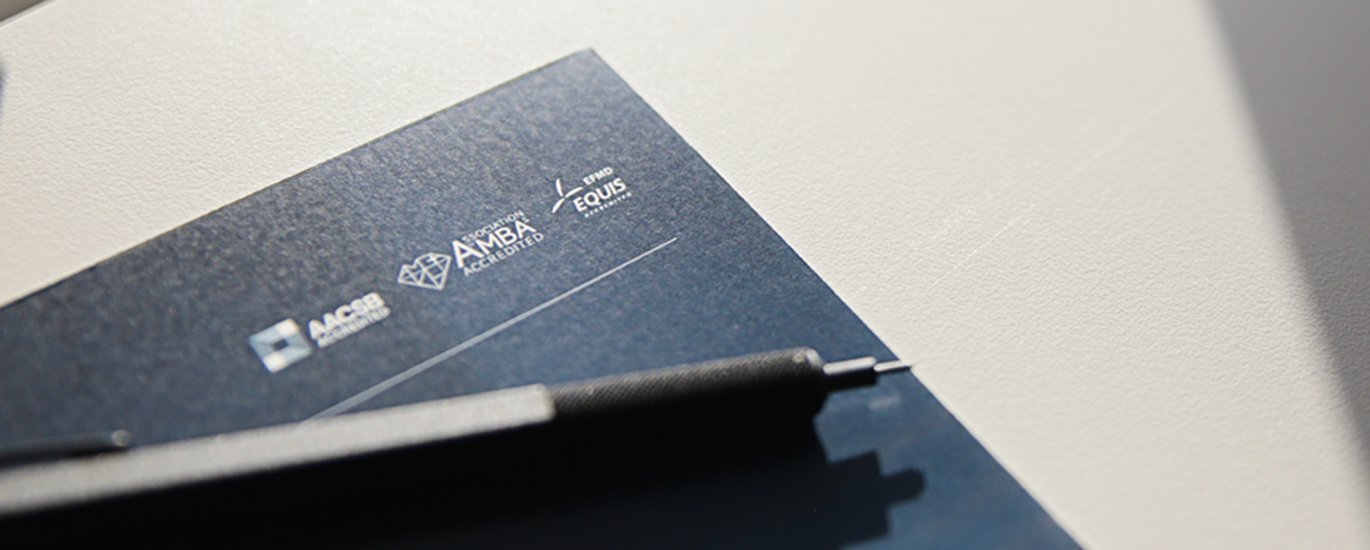EQUIS - and then what?
You have probably heard a lot about the school’s accreditations, but you might not know what makes them so important. What do they mean for Aarhus BSS - apart from a new logo in your email signature? Here we offer two suggestions for how the school can use the accreditations - externally as well as internally.

Accreditation. Seal of approval. EQUIS. EFMD. AMBA. These are words often heard at Aarhus BSS particularly during last autumn when the school went through two extensive accreditation processes. As you probably know, both processes had a successful outcome; we achieved a 5-year AMBA accreditation and a 3-year EQUIS accreditation, which now covers the entire school. So far, so good...
The question is what the accreditations actually mean for our school? Why are they important and how can we use them? This article zooms in on these questions. We have spoken to two of the school’s employees, who both took part in the recent accreditation processes. Here, they each offer their take on how Aarhus BSS can use the accreditations.
Strengthen the school brand
The first person we talk to is Jesper Qvistgaard, head of Aarhus BSS International. Much of the work in this department revolves around attracting international full-degree students to Aarhus BSS and making exchange agreements with international universities and business schools for the benefit of the Danish students. According to Jesper, Aarhus BSS is in fierce competition with other universities around the world. In this connection, accreditations are an important parameter allowing the school to stand out:
“Most of the time, international students haven’t got a lot to go on when they have to choose a foreign university,” he says. “Often they will look at markers such as accreditations and rankings when deciding where to go. For this reason, accreditations play an important role in our international marketing efforts - and we also use them when we make exchange agreements with other universities.”
Allow us to reflect
In other words, the accreditations make up a key part of Aarhus BSS’ international brand. However, according to Jesper Qvistgaard, they also play a crucial role inside our organisation. The reason is that the accreditation processes give us ample opportunity to reflect on our way of doing things, he says.
This view is shared by Associate Professor Carsten Bergenholtz from the Department of Management. He is convinced that the extensive self-evaluation which is part of the accreditation process contributes to strengthening the quality of our degree programmes - across academic fields. Among other things, the school is asked to prepare a comprehensive self-evaluation report as part of the process. This report can also be seen as a highly applicable tool in our internal quality development, says Carsten Bergenholtz:
“In the self-evaluation report, we have to give a thorough account of our organisation and our degree programmes in relation to everything from study environment to strategic goals,” he explains. “The report is prepared centrally, but consists of input from many different actors at all levels of the school. And they have all done a great job preparing the input. The report offers a really useful overview of our organisation - and of our way of doing things and structuring our degree programmes. I learned a lot from reading the report.”
Force us to see things from the outside
Apart from the self-evaluation report, Carsten Bergenholtz also highlights the dialogue with the panel of external experts that visit the school before the final decision is made. They bring with them a great deal of knowledge and experience based on their many visits to some of the world’s leading business schools. They see things from the outside, they ask questions and they challenge us, he says:
“To me the school gains a great deal from being evaluated by external experts. They are highly competent people who know a lot about how things are done around the world. They offer us good reasons for considering how we do things - and how we might do things in another - and more appropriate way. As such, the accreditation process forces us to look at ourselves from the outside - and from another perspective. This is a healthy exercise for any kind of organisation,” he concludes.